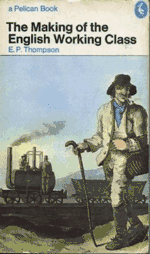The Making of the English Working Class
The Making of the English Working Class[1] is a work of English social history written by E. P. Thompson, a New Left historian. It was first published in 1963 and revised in 1968 by Victor Gollancz Ltd, republished by Pelican and became an early Open University set book. It concentrates on English artisan and working class society "in its formative years 1780 to 1832".
 First paperback edition, featuring a detail from a 19th-century aquatint by R. D. Havell. In the background, John Blenkinsop's locomotive can be seen. | |
| Author | E. P. Thompson |
|---|---|
| Country | United Kingdom |
| Language | English |
| Subject | Labour history Social history |
| Publisher | Victor Gollancz Ltd Vintage Books |
Publication date | 1963, 1968 (rev. ed.), 1980 (new preface) |
| Media type | Print (hardcover & paperback) |
| Pages | 848 |
| ISBN | 0-14-013603-7 |
| OCLC | 29894851 |
It was placed 30th in the Modern Library 100 Best Nonfiction books of the 20th century.[2]
Overview
Its tone is captured by the oft-quoted line from the preface:
- "I am seeking to rescue the poor stockinger, the Luddite cropper, the "obsolete" hand-loom weaver, the "utopian" artisan, and even the deluded follower of Joanna Southcott, from the enormous condescension of posterity." (Thompson, 1980: 12)
Thompson attempts to add a humanist element to social history, being critical of those who turn the people of the working class into an inhuman statistical bloc. Those people were not just the victims of history, and Thompson displays them as being in control of their own making: "The working class made itself as much as it was made." He also discusses the popular movements that are often forgotten in history, such as obscure Jacobin societies like the London Corresponding Society. Thompson makes great effort to recreate the life experience of the working class, which is what often marks the work out as so influential.
Thompson uses the term "working class", rather than "classes", throughout the book to emphasize the growth of a working-class consciousness. He claims in the Preface that "in the years between 1780 and 1832 most English working people came to feel an identity of interests as between themselves, and as against other men whose interests are different from (and usually opposed to) theirs". (Thompson, 1980: 11)
Thompson's re-evaluation of the Luddite movement and his unsympathetic treatment of the influence of the early Methodist movement on working-class aspirations are also particularly memorable. (Thompson's parents were Methodist missionaries.)
Thompson's theories on working-class consciousness are at the core of his work, and the working class's agency was manifested by its core values of solidarity, collectivism, mutuality, political radicalism and Methodism. Thompson wished to disassociate Marxism from Stalinism and his injection of humanistic principles in the book was his way of steering the left towards democratic socialism, as opposed to totalitarianism.[3]
Reception
Sidney Pollard called the book "without a doubt, a landmark in English historiography".[4] Robert K. Webb called it "both very important and extremely exasperating".[5] David Eastwood argued that it "transformed the study of labour, class and political radicalism in Britain and America and is incontestably the single most influential work of history of the post-war period".[6]
Geoffrey Best called it a "valuable and exciting book" but noted Thompson's neglect of the "flag-saluting, foreigner-hating, peer-respecting side of the plebeian mind" and asked, "How large a portion of 'the working class' did those 'artisans' form from whom so much of his evidence necessarily comes, and of how many hundreds of thousands of lower-class folk do we remain so much more ignorant that we cannot speak as confidently about them?"[7]
In April 2020, Jacobin magazine launched a podcast series, Casualties of History, focusing on the book.[8]
References
- Thompson, E. P. (1991). The Making of the English Working Class. Toronto: Penguin Books. p. 213. ISBN 978-0-14-013603-6.
- Modern Library, 1999. 100 Best Nonfiction
- Thompson, E. P. (1991). The Making of the English Working Class. Toronto: Penguin Books. ISBN 978-0-14-013603-6.
- Brian Harrison, 'Review: The Making of the English Working Class', The English Historical Review, Vol. 86, No. 340 (Jul., 1971), p. 574.
- Harrison, p. 574.
- David Eastwood, 'History, Politics and Reputation: E. P. Thompson Reconsidered', History, Vol. 85, No. 280 (October 2000), p. 65.
- Geoffrey Best, 'Review: The Making of the English Working Class', The Historical Journal, Vol. 8, No. 2 (1965), p. 278.
- "We've Got Another Seven Videos and a Podcast Out This Week". Jacobin (magazine). 14 April 2020. Retrieved 10 July 2020.
Sources
- Prall, S. E. (1976). Thompson, E. P. (Author of work under review). "Review: Whigs and Hunters: The Origin of the Black Act". History: Reviews of New Books. 4 (10): 225. doi:10.1080/03612759.1976.9945576.
Further reading
- R. Currie and R. M. Hartwell, 'The Making of the English Working Class?', The Economic History Review, New Series, Vol. 18, No. 3 (1965), pp. 633-643.
- F. K. Donnelly, 'Ideology and Early English Working-Class History: Edward Thompson and His Critics', Social History, Vol. 1, No. 2 (May, 1976), pp. 219-238.
- David Eastwood, 'E. P. Thompson, Britain, and the French Revolution', History Workshop Journal, No. 39 (Spring, 1995), pp. 79-88.